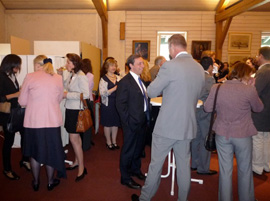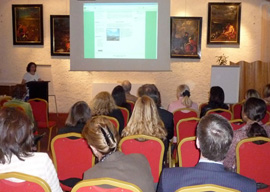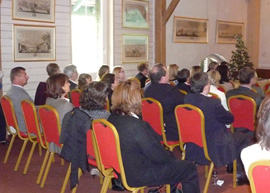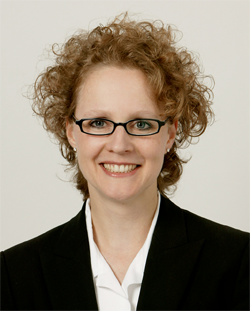If your CV needs to be provided in French, and you're not a native French speaker, you may want to enlist the services of a translation company to make sure your application (in particular the covering letter) is as accurate as it can be. If you're lucky enough to have already received a job offer, you may still need the services of a translator to help you understand the small print on your contract, especially someone qualified to do legal translations! Take a look at some of the linguistic services below that have been recommended to us:
ADR traductions Officiel
021 312 76 84
021 312 76 86 fax
www.traducteur-officiel.ch
This email address is being protected from spambots. You need JavaScript enabled to view it.
Provides legal and medical translations, interpreting services, official translation service for documents in French, English, Russian, Italian, German, Arabic, Chinese, Romanian, plus other languages for driving licenses, certificates, etc.
Jura Editorial Services sarl
Ward Rinehart
Sarah Johnson
0033/450 41 90 85
www.jura-eds.com
Offers English-language consulting, editorial, and publishing services to the international health and development community. Over 30 years of experience.
Helene Kubasky
Master of Arts in Translation
Diplom-Volkswirtin
076 576 15 81
This email address is being protected from spambots. You need JavaScript enabled to view it.
Top-quality translations of your English and French documents into German by a German-speaking professional translator.
Tracey Translations
David Tracey
021 807 06 09
www.traceytranslations.co.uk
This email address is being protected from spambots. You need JavaScript enabled to view it.
Translations from German to English by a professional translator and native English speaker with many years of experience.
In this section of the site, we provide all kinds of interesting articles and useful contacts, that are not covered elsewhere within our Careers section, but are designed to help you along your way, as you start to apply for jobs in Geneva, Vaud, or neighboring France.
The topics may be quite varied - the idea is to supply you with the tools you may require to make a successful job application.
To start us off in this new section of the site, we have a few links:
by James Cullinan, Founder of Busnet
 When we’re searching for a new job, we tend to devote most of our preparation to processing information. Yet, as the old adage claims, ‘it’s not what you know but who you know that matters’. Even in the information age, the evidence shows that networking can play a significant role in landing your ideal position.
When we’re searching for a new job, we tend to devote most of our preparation to processing information. Yet, as the old adage claims, ‘it’s not what you know but who you know that matters’. Even in the information age, the evidence shows that networking can play a significant role in landing your ideal position.
Great jobs are like beautiful houses, the best ones are usually already occupied. Business networking, however, is one of the tools you can use to position yourself for the best jobs available and the meteoric career path that follows.
Your prospective employer is looking for candidates who have both the technical ability to perform the required role and the interpersonal skills to fit the cultural dynamic of their company. Nick Staheyeff, Vice-President and CFO of eBay International, spends only 10% of an interview validating the technical skills and 90% of the time assessing the cultural fit.
It’s clear that in Suisse Romande most people prefer to work with those they already know and trust. When we network, we strengthen existing trust relationships and we build new ones. Since trust is such an important factor, this is a powerful component of your job search programme.
Also, big opportunities often emerge through people who are just outside of our personal network – through a contact of a contact. Attending events in the region allows a powerful network to form around you, which extends your reach and helps to create fresh opportunities.
Searching for the ideal job is complicated by the problem of information asymmetry: You know your unique combination of values, skills and talents, but you don’t know who needs them. On the other hand, there are employers out there who know what skills and values they need, but they don’t know which candidates offer these qualities.
The value of face-to-face networking events is that they help cut through the problem of information asymmetry, because they bring people who know about your unique talents into contact with people who know about current job opportunities. Some people are particularly good at making this link and putting you in touch with those who could help you. In The Tipping Point, Malcolm Gladwell describes these people as connectors.
To help this process along, you need a clear résumé-pitch: a simple way of presenting your objectives, values and unique talents in order to win the support of those you speak to. People are more likely to hire you if you can provide the solution to a problem that is causing them pain. Where possible, you should tailor your messages to each specific discussion to keep them fresh and relevant.
Informal conversation is probably the oldest mechanism for developing, expressing and spreading ideas. A one-to-one discussion is great for investigation (e.g. uncovering the salient details of a particular employer’s current needs) and it can also provide a helpful forum for presenting your pitch and getting feedback (there are no mistakes, only lessons!). Vocalising your ideas often forces you to structure and clarify your thoughts more succinctly.  Often a networking event will have a guest speaker or a theme. It makes sense to prioritise the events that are closest to your desired area of work, since this is where you will come into contact with those who presently work in your target field and are most able to help you with topical information and warm leads.
Often a networking event will have a guest speaker or a theme. It makes sense to prioritise the events that are closest to your desired area of work, since this is where you will come into contact with those who presently work in your target field and are most able to help you with topical information and warm leads.
Initiating conversation doesn’t have to be funny or profound. Most attendees of a networking event are there for similar reasons, so it’s perfectly acceptable to approach someone you don’t know and introduce yourself. Normally you will discover an area of common interest within about five minutes. After all, many of your friends today were strangers once.
To broaden your base of contacts, and get a range of fresh perspectives, you need to meet as many people as possible (what politicians call ‘working the room’). This can seem intimidating at first, but it becomes an easy habit.
Most conversations start with idle small talk and rapport-building, however there are some broad guidelines that can help you become more artful, for example:
- it’s often easiest to start with a topic that connects you
- it’s usually better to be neutral or positive in your outlook
- give the other person the time and space to feel comfortable talking to you
- build the conversation gradually, and try to keep monologues short
- try to stay attuned to the needs of those around you
- reciprocate another persons interest with genuine curiosity about their topics
- think of ways that you could help others achieve their goals
- try to keep the conversation flowing, without monopolising anyone
- if you end the discussion, try to introduce them to someone else
- always give a respectful reason for leaving
After some preamble, it’s perfectly acceptable to share your job search plans. Networking is a bit like speed dating, and you may not have long before that person moves on! Your pitch should be eloquent and clear.
Many job searches begin with a low-intensity phase, when you are still forming your ideas of exactly what you want to do next, and how you plan to get there. It’s fine to share your ‘work in progress’ provided you keep it interesting. You are the captain of your ship, so ensure that you don’t come across as too indecisive or rudderless!
Try to exchange business cards with each worthwhile contact, as this provides a simple way of resuming contact at a future date. Having a good filing system for business cards is a great time-saver. A useful technique is to write a few details about that person on the back of their card soon afterwards, to help you remember the context of your discussion. If you have discovered a topic of mutual interest, that can make it easier to send a follow-up email. You can only know the true value of a networking discussion long afterwards. It’s a small world, and someone who may not have inspired you when you first met may one day hold the key to your next career move. The personal connection comes first, and the business rationale usually only emerges later.
You can only know the true value of a networking discussion long afterwards. It’s a small world, and someone who may not have inspired you when you first met may one day hold the key to your next career move. The personal connection comes first, and the business rationale usually only emerges later.
Try to renew good relationships at regular intervals, as this will make it easier for you to ask a favour of your new contact when they are in a position to help you. Using your network is all about reciprocity. Unless you are very lucky, you normally need to give help before you can get it.
Building your network is a bit like planting a forest. As we all know, the best time to plant a forest was ten years ago, the second best time is today. It’s highly likely that networking will play a central role in finding your next career move, so it pays to embrace it and to enjoy the process of making new contacts and sharing ideas. This is an essential part of what makes your job search pleasurable!
James Cullinan is the founder of BusNet [‘biz’net] a ‘network of networks’ designed to help individuals collaborate. Based on the mantra of 'Right Place, Right Time, Same Wavelength' they provide an ‘at-a-glance’ listing of business events from over 50 business networks in Suisse Romande [www.localbusnet.com]. James also writes a fortnightly blog on networking.
Top 10 tips for event networking:
1. Know what events are on [www.localbusnet.com]
2. Prioritise those meetings with a relevant theme
3. Do your background preparation [desk research]
4. Clarify your résumé-pitch
5. Work the room, captain your ship
6. Find areas of common interest
7. Connect with the connectors
8. Speak with confidence and purpose
9. Swap business cards
10. Follow-up afterwards
The following is a list of professional counselors who have been recommended to us:
Croft Coaching Services
Geneva to Vevey
Debbie Croft
079 918 85 71
www.croftcoaching.com
Personal and professional coaching for individuals who feel stuck at a crossroads, be it in their career or in life, as a result of relocation and/or parenthood. Customized programs to build awareness, clarity and conviction; so that you can make powerful choices to create fulfilment and balance.
Duru Consulting
Career Management and Development
Ch. de la Plaine 4
1055 Froideville
Sedef Duru
079 697 97 86
021 652 82 25
www.duruconsulting.com
Supports professionals to develop career management skills to reach their goals. See page <OV> for full description.
Includera - Counseling and Psychotherapy
8B, ch. du Joran
1260 Nyon
Rani Treichel (MBACP, ASCA)
078 928 80 85
www.includera.org
An in-depth, holistic and compassionate approach to discovering more of who you are, where you may be stuck and accessing the tools to create meaningful personal and professional changes.
Mind-Body Center
1, rue de la Combe
1260 Nyon
Sheila Walsky, SGfB, ASCA
078 685 7050
www.sheilawalsky.com
Sheila Walsky, founder and owner of Mind-Body Center S.A. provides psychological counseling and coaching to adolescents and adults. She holds an MBA, an MA in Counseling, a Swiss Advanced Federal Diploma in Psychosocial Counseling, and post-graduate diplomas in body focused trauma therapy, Somatic Experiencing and Internal Family Systems therapy.
MJ Cabanel Coaching
5, ch. de Montelier
1275 Cheserex
Mary-Jeanne "MJ" Cabanel MBA, CPCC
www.mjcabanel.com
Coach, consultant, and trainer. Her mission is Happiness at Work and she promotes this by partnering with multinational corporations, organizations to create aligned teams, and inspiring leaders. MJ also works with individuals. She has MBA and CPCC diplomas.
SCC SARL CENTRES
Geneva, Nyon, Lausanne
Diana Ritchie
078 808 35 97
www.scc-centre.com
Diana Ritchie is the owner and founder of SCC Sàrl, which provides coaching and training for individuals and organisations, who are seeking Self Development, Talent Development and Performance Development. She makes use of a large palette of methods and techniques to deliver great success to her clients.
Owl RE
2c, ch. Martinet
1291 Commugny
022 776 62 13
076 325 62 13
Glenn O’Neil
www.owlre.com
Supports organizations in analyzing, assessing and evaluating activities in the communications, training/events and development fields.
Thriving Talent Solutions
Ch. des Tattes 18
1195 Bursinel
Natalie Wilkins
Deborah Croft
www.thrivingtalent.solutions
Helps organizations to support employees with the transition to parenthood; crucially keeping talented mothers and fathers engaged and helping mothers return to work after maternity leave.
Walk The Talk
Sunita Sehmi
076 532 21 37
www.walkthetalk.ch
This email address is being protected from spambots. You need JavaScript enabled to view it.
Walk The Talk provides Executive Coaching, Training, Facilitation and Consulting services, locally, globally and virtually. Sunita's deep interest is creating personal transformational learning experiences that enable clients to acquire the knowledge and skills they need to excel. Call her for a free needs analysis session.
 Scientific surveys still show a significant gap in the salaries of men and women, with women earning around three quarters ot the salary of men. Various studies as well as a recent article in Tages-Anzeiger indicate that the way salary negations are approached by women may be one possible explanation for this unfortunate situation. KPMG, one of the world's leading providers of audit, tax and advisory services, is convinced that women should not be disadvantaged in salary negotiations simply because they aren’t aware of frequent stumbling blocks and the possibilities to avoid them.
Scientific surveys still show a significant gap in the salaries of men and women, with women earning around three quarters ot the salary of men. Various studies as well as a recent article in Tages-Anzeiger indicate that the way salary negations are approached by women may be one possible explanation for this unfortunate situation. KPMG, one of the world's leading providers of audit, tax and advisory services, is convinced that women should not be disadvantaged in salary negotiations simply because they aren’t aware of frequent stumbling blocks and the possibilities to avoid them.
To examine the subject further, OWIT Lake Geneva has organized a special presentation entitled Negotiating your Salary. To be held on Thursday, 18 January, the event will be sponsored by KPMG and co-hosted at their offices in Lausanne.
During the evening, KPMG will focus on some of the obstacles women might need to overcome in order to be more successful in salary negotiations in the future. KPMG will provide some background information as well as hints and experiences from successful women in their company. In addition there will be time for attendees to exchange experiences with each other and to discuss the best strategy in negotiation situations.
The presentation will be led by Chantal Buechi Neher, Head of Human Resources for KPMG. Ms. Neher started her career with KPMG in 1999 and has held different HR positions during the past 11 years from HR Manager for Audit Financial Services to Deputy Head HR Switzerland and HR COO.
Chantal is currently the Head of HR for KPMG AG (Zurich). She holds an Executive Master of Human Resources Management from Olten, Switzerland.
For further information, visit the website: www.owit-lakegeneva.org.
Venue: KPMG Offices, Avenue du Théâtre 1, 1002 Lausanne (website: http://www.kpmg.ch)
Cost: CHF 20 for all participants (all proceeds go to OWIT Lake Geneva's Room to Read charity: www.roomtoread.org). Additional donations are kindly accepted.
OWIT Lake Geneva ((Organization of Women in International Trade - Lake Geneva) is a non-profit making organization whose goal is to promote the advancement of women in business and international affairs, providing opportunities for networking and professional development.










